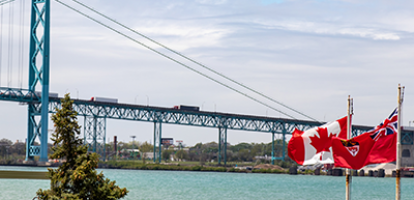As Canada forms its next government, the Prime Minister’s Office will be preparing ministerial mandate letters. In this special Intelligence Memo series, policy experts highlight key challenges and priorities in each minister’s portfolio.
To: The incoming Ministers of Transport and Infrastructure
From: Benjamin Dachis
Date: November 1, 2019
As you embark on the start of your terms as Ministers of Transport and Infrastructure, your top priorities should include:
- Eliminate the cap on revenues from grain shipments that rail companies can collect. The cap means that if a rail company charges higher prices for a grain customer, the company must lower prices for other grain customers than what the market would normally bear. The result may be lower investment and lower service levels.
- Build on the previous government’s raising of the voting-share ownership limit in CN Rail by any individual owner to 25 percent from 15 percent. A similar restriction for domestic airlines was recently raised from 25 percent to 49 percent. You should now totally abolish both ownership limits. Such restrictions increase the cost of borrowing and limits the size of the available capital pool to finance the purchase capital and make companies more vulnerable to cyclical downturns. Rely instead on the Investment Canada Act to block major foreign purchases that may be detrimental to Canada.
- Revisit a part of bill C-49, passed last year, that empowered the Minister of Transport to allow airline joint ventures, like code-sharing, even when the Competition Bureau thinks they are anti-competitive. If you choose to retain this, amendments to the legislation should require that both the minister’s and the bureau’s full decisions become public.
- Rethink the ownership model of airports and seaports. Start with a voluntary program in which airport authorities that wish to open up ownership can do so. Private airports are becoming commonplace around the world and tend to be less costly for passengers. Such sales could raise between $7.2 billion and $16.6 billion. Similarly, unlock the federal government’s $2.6 to $3.4 billion in equity value in major seaports by bringing in private investors. Create an arms-length regulator in cases where monopoly power may be a concern.
- Revisit the governance of the Canada Infrastructure Bank (CIB). If done right, doing large infrastructure projects through the CIB has the potential to significantly improve the effectiveness of infrastructure investment in Canada’s cities. The CIB and its governance should be reformed, not eliminated.
- When the ministry and the CIB analyze individual investments, only support projects that exceed the social opportunity cost of capital, which is the marginal cost of public funds.
- Increase the role of private sector investment in infrastructure instead of government funding through increased private ownership or use of public private partnerships. Ignore arguments that the government can borrow at a lower cost. Public borrowing looks risk free for investors, but it isn’t risk free for taxpayers. Public private partnerships are a successful way of reducing risk in the design, finance, and construction stages of infrastructure.
- Reduce grants to lower-tier governments for infrastructure. Grants from a higher order of government create numerous problems for local governments. They can lead local governments to spend more on low value-for-money projects when failure to use a grant risks losing access to federal funds.
- Limit grants for infrastructure to two criteria, both based on inter-jurisdictional spillovers. First, when infrastructure can expand trade for producers across the country and the benefits are shared across provinces. Second, when tax revenues from productivity enhancing infrastructure supports the federal bottom-line.
Benjamin Dachis is Director of Public Affairs at the C.D. Howe Institute.
To send a comment or leave feedback, email us at blog@cdhowe.org.
The views expressed here are those of the author. The C.D. Howe Institute does not take corporate positions on policy matters.





